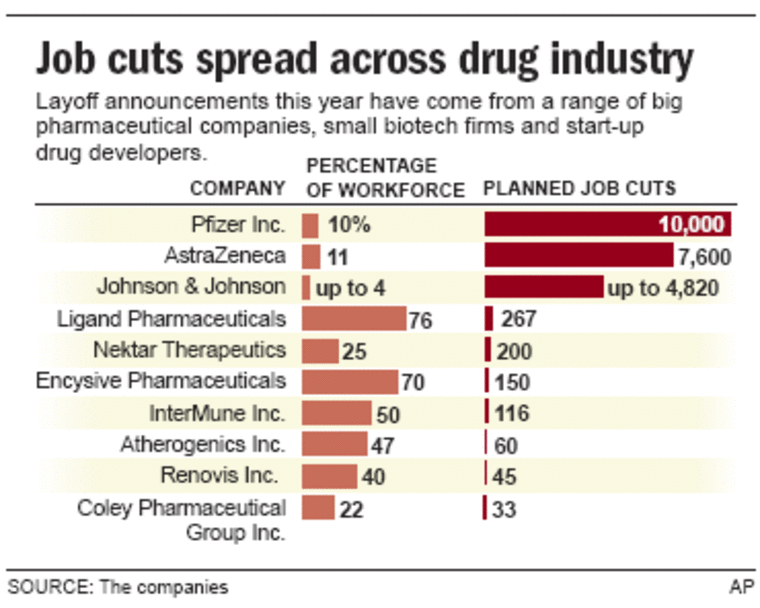When the traditional safe bet among the big pharmaceutical companies, giant Johnson & Johnson, starts the biggest restructuring in its 121-year history, it’s clear things aren’t rosy for the industry.
J&J’s plan to cut up to 4,800 jobs follows news of tens of thousands of job cuts at Pfizer Inc., Bristol-Myers Squibb Co., Astra Zeneca PLC, Merck & Co. and Schering-Plough Corp.
Pfizer, the world’s biggest drug company, is eliminating 10,000 jobs, 10 percent of its work force. Merck is shedding 7,000 jobs, AstraZeneca is slashing 7,600 positions, Schering-Plough has furloughed about 1,100 manufacturing workers and Bristol-Myers Squibb will cut an unspecified number of jobs by year’s end.
All but Merck and Schering-Plough announced their layoffs this year, as have many small, cash-strapped drug and biotech firms forced to reduce up to half their jobs, often after a big pharmaceutical company ends a research partnership.
Analysts say such cost cutting is generally the only option to improve the bottom line quickly, as it’s likely to be a few years before drugmakers can get past major hurdles.
Those include generic competition for blockbuster medicines, insufficient drugs in development, patent challenges, pressures to reduce prices, and skittishness among U.S. regulators about approving drugs with safety issues.
Analyst Steve Brozak of WBB Securities says Wall Street is partly to blame.
By unrealistically demanding the same double-digit profit growth the industry produced through the 1990s, big investors are forcing pharmaceutical companies to scuttle external research partnerships, then reduce head count and other expenses, Brozak said.
“You’re seeing senior VPs ... eliminated at these companies,” replaced by junior people with less savvy but half the salary, he said.

Analyst Barbara Ryan at Deutsche Bank said she sees more than the usual industry ups and downs, largely because managed-care insurers and prescription benefit managers now shift patients from brand-name drugs to new generic versions as soon as they’re available.
“Your revenues basically are decimated within weeks,” Ryan said. “Now you can lose billions of dollars virtually overnight.”
That used to take a year or more.
In 2006 and 2007 alone, brand-name drugs with combined sales totaling $39 billion lost patent protection, according to health information company IMS Health.
“The big problem for the industry is 2010 and 2011,” Ryan said.
That’s when patents expire for some huge sellers, including Pfizer’s cholesterol treatment Lipitor, Wyeth’s antidepressant Effexor XR, blood thinner Plavix (a Bristol-Myers Squibb/Sanofi-Aventis SA partnership) and Eli Lilly & Co.’s anti-psychotic Zyprexa. Lipitor, the world’s top-selling drug, had sales of $12.9 billion last year, and the other three drugs have annual sales of $3.5 billion or more.
Despite pouring more money into research, drugmakers are finding it much harder to come up with new one-pill-fits-all drugs for chronic conditions.
Recently, some widely seen as likely blockbusters have been rejected — or hit with demands for time-consuming additional studies — by U.S. regulators. They include weight-loss drug Acomplia at Sanofi-Aventis, and Wyeth’s Pristiq, the first nonhormonal treatment for menopause symptoms.
Also, more experimental drugs are failing in the final, most-expensive stage of testing, sometimes just because they are “not better enough” to replace existing, cheaper ones on HMOs’ list of preferred drugs, Ryan said.
A.G. Edwards analyst Joseph Tooley sees some positive signs, though. The volume of drug sales has been very strong and, combined with cost-cutting, has brought companies out of their earnings slump for now. The big companies needed to become more efficient and able to respond quickly to market changes anyway, he said.
Despite the layoff announcements, pharmaceutical industry recruiting agencies and Internet job boards say it’s not all bad.
At Kelly Scientific, which places chemists, biologists and the like from entry level through top officers, demand for candidates is still high, said Rich Pennock, who heads the unit. He sees particularly high demand in New Jersey, Philadelphia, Boston, Southern California and San Francisco.
Meanwhile, HireLifeScience.com, a job board for pharmaceutical, biotech and medical device positions, has had nearly a 20 percent increase in job applications over last year.
But at job board hireRx.com, run by the Massachusetts Technology Corp., CEO Richard Kneece sees a big slowdown in sales. “You’re seeing a shift from large companies (hiring) to smaller ones because they’re more nimble,” he added.
At the Lucas Group, senior partner Ned Hansen saw the bigger pharmaceutical companies start cutting back on requests for executive candidates six to eight months ago.
“I think you’re going to hear about more layoffs coming over the next six months,” Hansen predicted.